A Quote by Thomas Sowell
What freedom does a starving man have?" The answer is that starvation is a tragic human condition- perhaps more tragic than loss of freedom. That does not prevent these from being two different things.
Related Quotes
Everyone talks about freedom. All around the world different people, different races, different countries are fighting for freedom. But what is freedom? In America we speak of living in a free country. But are we really free? Are we free to be who we really are? The answer is no, we are not free. True freedom has to do with the human spirit-it is freedom to be who we really are. Who stops us from being free? We blame the government, we blame the weather, we blame our parents, we blame religion, we blame God. Who really stops us from being free? We stop ourselves.
Trusting people to be creative and constructive when given more freedom does not imply an overly optimistic belief in the perfectibility of human nature. It is, rather, belief that the inevitable errors and sins of the human condition are far better overcome by individuals working together in an environment of trust and freedom and mutual respect than by individuals working under a multitude of rules, regulations, and restraints imposed upon them by another group of imperfect individuals.
Where hunger is imposed by external circumstances, the act of starvation remains literal, a tragic biological event that does not serve metaphoric or symbolic purposes. It is only in a country where one is able to choose hunger that elective starvation may come to express cultural conflict or even social protest.
The insistence on truthfulness does not disturb the freedom of the individual. The social obligation implied in Satyagraha turns the freedom of the individual into moral freedom. An atheist is free to say or to do what he likes, provided he does what he says and says what he does. So, in the context of social relations, the freedom of the individual is moral freedom.
The industrial and social injustice of our era is the tragic aftermath of democracy's overemphasis on freedom as the "right to do whatever you please." No, freedom means the right to do what you ought, and ought implies law, and law implies justice, and justice implies God. So too in war, a nation that fights for freedom divorced from justice has no right to war, because it does not know why it wants to be free, or why it wants anyone else to be free.




































